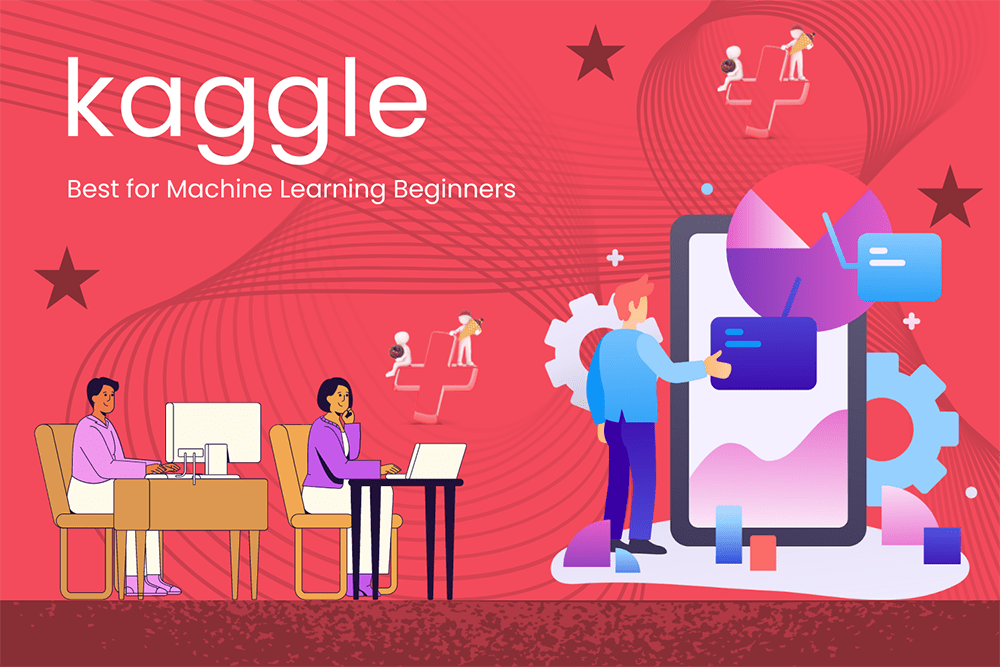Kaggle is a Google-founded online community committed to Data Scientists and Machine Learning. It is the world’s largest data community, with members ranging from ML newcomers to some of the world’s greatest academics. Kaggle is also a great location to start experimenting with data. It includes over 23,000 public datasets and over 200,000 online notebooks! And in case that’s not enough, Kaggle also conducts various Data Science competitions with absurdly huge pay rewards. In this article, why Kaggle is useful to machine learning beginners is explained.
Kaggle not only hosts the coding competitions but also is a platform for beginners. It provides basic courses for Data Science and Machine learning. Also, it hosts the basic competitions which helps the beginners to get started with the machine learning environment. With the help of courses and competitions beginners could get familiar with the Coding and ML environment.
Some of the resources provided by Kaggle for Beginners to get started and getting them to experts:
Datasets:
There are around 23, 000 public Datasets available for free download on Kaggle. In reality, several of these databases have already been downloaded millions of times. You may use the search box to look for public datasets on any topic, from health to science to famous cartoons! On Kaggle, you may also generate new public datasets, which can win you medals and lead you to advanced Kaggle titles like as Expert, Master, and Grandmaster.
Notebooks:
There is no need to download the Notebooks on Kaggle because they are virtual Jupyter notebooks that can be launched in the cloud. And they’re completely free! Using the “Copy and Alter” option, you may see the code in a notepad, edit it, or add graphics (basically whatever you want!). By clicking on the “New Notebook” button, you may also construct a new notebook from scratch (also known as a kernel).
Courses:
On Kaggle, there is an extensive collection of Free Courses relating to Data Science and Machine Learning that will teach you all you need to know to get started. While these courses are not comprehensive, they are the quickest way to begin practicing on Kaggle. The Micro-Courses (as they are known) begin with the fundamentals such as Python, Machine Learning, SQL, and Data Visualization and progress to more sophisticated subjects such as Pandas, Deep Learning, Geospatial Analysis, and so on.
Discussions:
Aside from the ability of commenting in Notebooks, Kaggle has a complete Discussion area. This Discussion area contains the Kaggle Forum, QnA where you can ask other Data Scientists for help, Getting Started (the first stop for novices), Product Feedback, and Learn (QA for Kaggle Courses). Check visits this section to learn more about Kaggle and ask questions!
Competitions:
It is time to move on to the Competitions after you have spent some time with the Kaggle Datasets and Notebooks. Kaggle competitions are a terrific opportunity to put your knowledge to the test. From the test, it could be determined where you stand in the field of data science! If you are just starting out, you should practice classic competition issues like Titanic: Machine Learning from Disaster. After that, you may go to the active competitions and perhaps win large cash rewards!!
Blog:
Kaggle has an official blog with topics ranging from “The Future of AI in Africa” to “Teaching an AI to Dance”! The Kaggle blog also provides lessons on topics such as Neural Networks and High Dimensional Data Structures. You may also find Kaggle news here, such as interviews with Grandmasters and Kaggle updates.
Jobs:
Finally, whether you are looking for work or looking for work, Kaggle offers a Job Portal! If you are recruiting, you can establish a Job Listing and have access to the 1.5 million data scientists on Kaggle. If you are looking for work, you may also subscribe to the Kaggle Jobs Board to gain access to available employment positions.
Getting started as beginner on Kaggle:
The outline to follow as a beginner on Kaggle is as follows:
Select a programming language in which you want to code:
For Data Science and Machine Learning, currently Python and R are the most widely used programming languages. Python is preferred for the development background users whereas R could be used by the analytical background users. Python, currently is the most famous and used language for machine learning with numerous libraries as Keras, TensorFlow, Scikit learn, and many more. Thus, for a beginner it is recommended to use Python for machine learning.
Learn on standard Datasets:
As mentioned, Kaggle has around 23000 publicly available datasets for the user’s practice. As a beginner it would be difficult to understand the datasets, thus the best practice is to begin with the standard available datasets on Kaggle such as Indian Liver Patient Records, Iris Species, Adult Census Income, Breast Cancer Wisconsin, etc.
Practice on Kaggle Competition Problems:
As a beginner, you can check on the previously held Kaggle competition problems. You can take the basic idea form the participants code and solve the problems.
Compete in Active Kaggle Competitions:
Once, you practice, as a beginner you can start taking part in the active competitions. Slowly and gradually with practice a beginner could turn into an expert on Kaggle.


